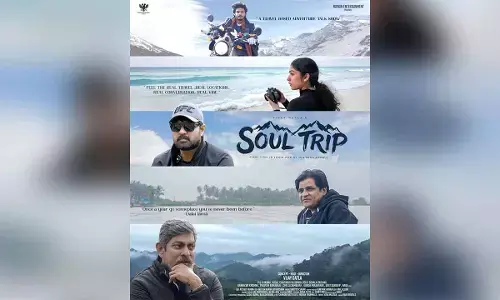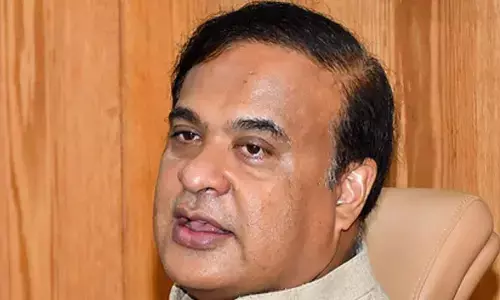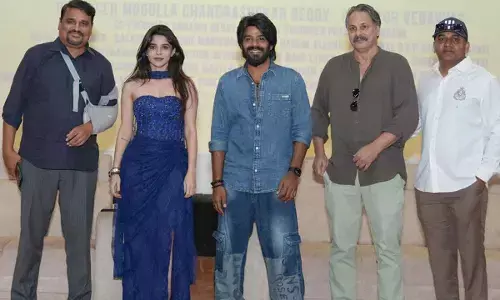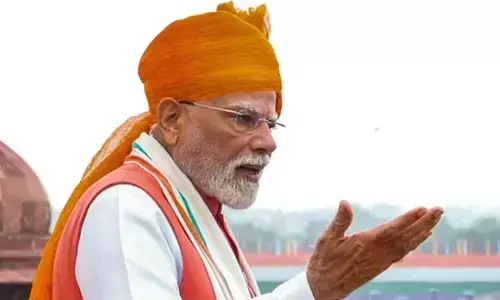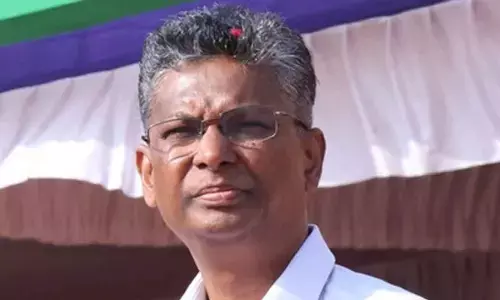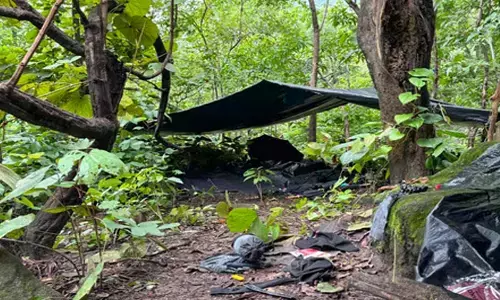The queen of music
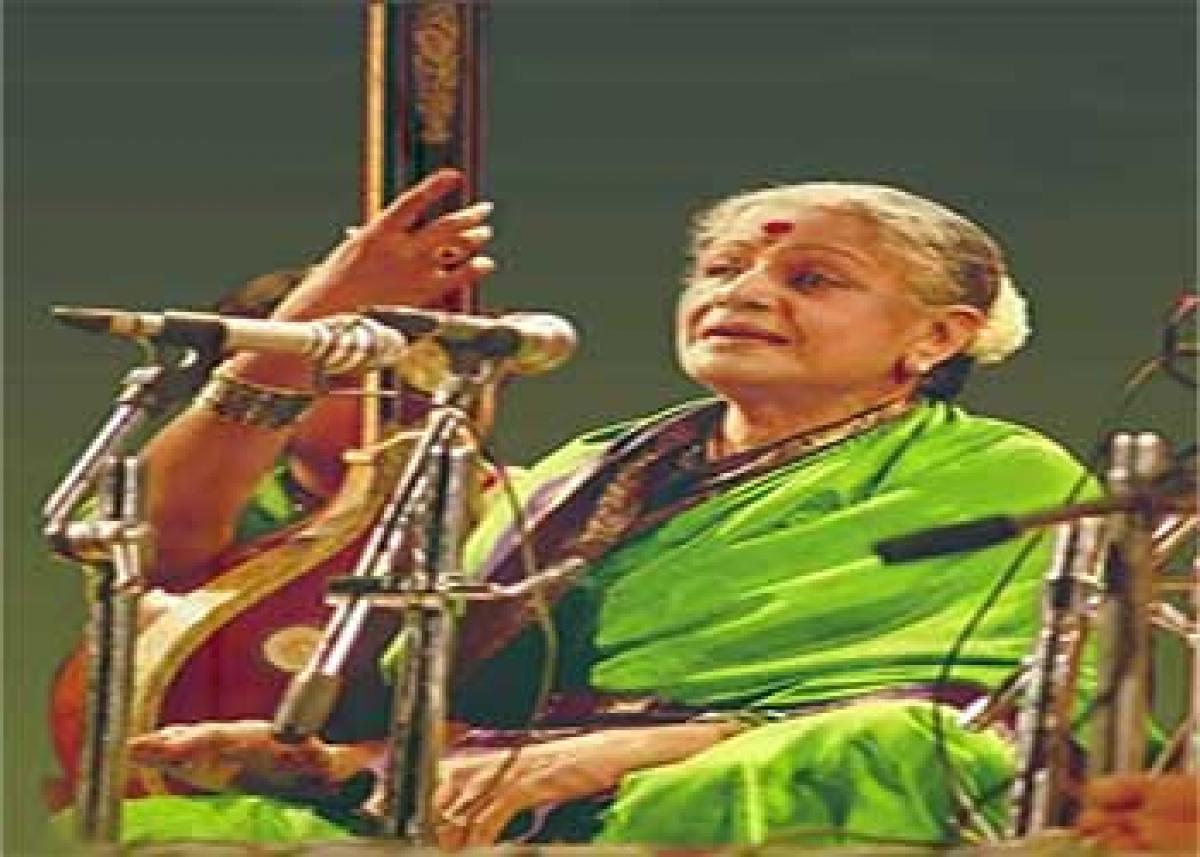
Music was not just a career to MS Subbulakshmi. It was her mission in life. An artistic inventor, she was more intuitive than systematic. Subbulakshmi, highly devout by birth, was convinced that music is no amusement. Music, as she understood and pursued, was a conduit to understand and experience the divine.
.jpg) Revered singer MS Subbulakshmi was born on September 16. The doyen of Carnatic music was the first musician to be awarded the Bharat Ratna, India's highest civilian honour. Fondly known as MS, was a rare genius as a singer of classical music. She has garnered many admirers in her flourishing career. And her legacy still lives on
Revered singer MS Subbulakshmi was born on September 16. The doyen of Carnatic music was the first musician to be awarded the Bharat Ratna, India's highest civilian honour. Fondly known as MS, was a rare genius as a singer of classical music. She has garnered many admirers in her flourishing career. And her legacy still lives on
“Beautiful music is the art of the prophets that can calm the agitations of the soul; it is one of the most magnificent and delightful presents God has given us.”-Martin Luther
The music of Madurai Shanmukhavadivu Subbulakshmi, MS, -- as the entire world of music knows and reveres her – has a primordial touch. Numerous elucidations are suggested to drive home the celestial quality of her music.
Music was not just a career to MS Subbulakshmi. It was her mission in life. An artistic inventor, she was more intuitive than systematic. Subbulakshmi, highly devout by birth, was convinced that music is no amusement. Music, as she understood and pursued, was a conduit to understand and experience the divine.
"Kurai onrum illai" (I have no regrets), which she habitually used to sing in many of her concerts, speaks of her attitude towards life and music as well. Music as a means to spiritual quest places her in the same legion as Meera belonged. Personal humility added, the artiste gains the grace of a saint!
"I would have exchanged my whole kingdom for this Kalyani raga,” Maharaja of Udaipur reportedly said, pouring out his admiration for her singing talent. This happened while she was on a shoot for the film 'Meera' (1944) wherein she portrayed the protagonist. Sarojini Naidu, spelling out a prologue of sorts to the film said: "You will be proud that India in this generation has produced so supreme an artiste."
It may be a “Bhaja Govindam” or a “Vishnu Sahasra Namam” or a “Venkateswara Suprabhatam”, every morning, almost each Hindu home and temple reverberates with her renditions. Besides, “Kurai onrum illai” (composed by Rajagopalachari), Hanuman Chaalisa are also highly loved.
MS Subbulakshmi was born on September 16, 1916 at the temple town of Madurai in Tamil Nadu. She was born into a ‘devadasi’ family and her mother Shanmugavadivu was a Veena player. Akkammal, grandmother of MS, was also a musician and a violinist. MS was fondly called ‘Kunjamma’ in her family and her early tutelage into music was from the legendary Semmangudi Sreenivasa Iyer. She was taught Hindustani music by Pandit Narayan Rao Vyas.
Her family lived close to the Meenakshi Amman temple of Madurai and the child Kunjamma would regularly listen to the 'nadaswara' vidwans playing their piped instruments as and when the deity is taken on a ritualistic procession through the streets around the temple.
"My earliest interest in music was focussed on the raga. I would try to reproduce the pipers as well as I could. My mother played and rehearsed constantly. No formal lessons, but I absorbed a whole wealth by listening and humming along with the veena," MS recollected.
Her first stage performance was given when she was hardly 11-years-old in 1927. The violin maestro of those days, Mysore Chowdaiah accompanied her on violin. In 1929, at age of 13, she performed in Madras Music Academy and was almost instantly catapulted to the level of a busy and sought after performer.
Between 1938 and 1947, she acted in about half-a- dozen films - the most remembered of them being ‘Meera’ in Tamil and ‘Meera Bai’ in Hindi. As MS was evolving as a singer in her teens, Karaikudi Sambasiva Iyer said: "Child, you carry the veena in your throat."
In 1940, Subbulakshmi married Sadasivam, who, for the entire life, carefully mentored and nurtured her musical career.
He was her benevolent first critic about her performances. Sadasivam had the modesty to unobtrusively remain in the background in her moments of triumph while assiduously planning and modeling her career. Subbulakshmi acknowledges: “By his loving care, he is my parent; by his unerring guidance, he is my preceptor.”
Apart from countless live concerts all across the nation, MS gave performances beyond the frontiers of the nation at prestigious international forums. She rendered all her music with a deep rooted commitment. She must have been convinced that music transcends wisdom and philosophy and that it is the language of angels.
Kritis of Tyagaraja, Dohe of Goswami Tulsidas or the Bhajans of Meera Bai attained eternity through her voice. A single ‘kriti’ rendered by MS on plentiful occasions blooms each time with myriad nuances suggesting many shades of mellifluousness. Her deep understanding of several ragas like Hindolam (‘Devadevam Bhaje Divya Prabhavam’), Revathi (‘Naanaatibadukunaatakamu…
Kaanakakannadikaivalyamu…..), Thodi, Kedara Gowla, Sankara Bharanam and several others was unmatched.Bhajans of Tulsidas, Kabir, Surdas, Nanak and the abhangs of Tukaram, apart from those of Meera, were liberally included in several of her concerts all across the country – be it Jabalpur, Pune or Jaipur.
In her personal life – her attire, appearance as well as lifestyle – she was the exact prototype of a south Indian housewife, mother or grandmother, resembling countless women of her generation. She remained detached from glitter, she commanded as an artiste par excellence. People say she would be immensely pleased when handed over with a string of jasmines! But for the whole world, she was a world class career person and singer who transformed the very aura of Carnatic music during the century she lived in.
"MS does not sing, she makes divinity manifest," someone succinctly said.Several business tycoons of the day valued an MS recital at a family wedding not as a status symbol but a blessing for the newlyweds.MS had an immaculate control on the diction of various languages. She knew perfectly the modus of breath control, voice modulation, and splitting phrases properly, thereby emphasising the meaning.
The appeal she gained is, due to the cosmic collection of songs in several languages including the range of classical compositions. Whether Hindi, Gujarati bhajan, Marathi abhang, Rabindra sangeet, Sanskrit sloka or Tamil Tiruppugazh, they are all marked by a distinct lyrical allure and a philosophic undercurrent. Even the feathery numbers acquire an insightfulness of their own.
As the Carnatic music critic and admirer Dr VK Narayana Menon saw it: "She is, no doubt, constrained to sing music she would rather not. But that is the price one has to pay for being a celebrity. A musician is at once an artist and public entertainer and it is not easy to set aside the wishes of large sections of one's audience.
This is not succumbing to popular acclamation. It is a kind of invested responsibility."True to her simplicity, she was difficult to be induced into conversation on music. In one such interview, she observed: "The ragaswarupa must be established at once.
Don't keep the listener in suspense as to whether it is Purvikalyani or Pantuvarali... Much of this I kept discovering as I listened and sang. Learning the veena from Vidwan KS Narayanaswami, later in life was very beneficial in this search to understand raga intricacies.
In a musical career spanning for seven decades, quite many awards came her way. Bharata Ratna, the highest civilian award was conferred on her in 1998. She happens to be first ever musician to receive the honor.MS Subbulakshmi was introduced to Mahatma Gandhi in the context of organising musical performances by her for raising a corpus for Kasturba Memorial Fund. Mahatma Gandhi succinctly complimented Subbulakshmi.
MS sang the Meera Bhajan ‘Hari Thuma Haro’, which was Bapu’s pet number. It was recorded by All India Radio and was broadcast on October 2, 1947 (Gandhiji’s birthday).Invidious and arduously lengthy could be the list of her admirers. Celebrities among her admirers include the first President of India Babu Rajendra Prasad; Jawaharlal Nehru and Dr Radha Krishnan.
Pandit Ji reportedly made a complimentary quipping – “Who am I, a mere Prime Minister, to speak about this Queen of Music, Queen of Songs?”Lata Mangeshkar called her a true ‘Tapaswini’, the meditative saint! Her simplicity and humility knew no bounds. When the proposal came to appoint her as the first ‘Asthana Vidwan’ for Tirumala Tirupati Devasthanam, in all modesty she was hesitant that there were other eminent stalwarts in the field like Ariyakkudi Ramanuja Iyengar, Musiri Subramania Iyer and Semmangudi Srinivasa Iyer to be considered.
Simply unthinkable in these days of unabashed run after self-glorification.Subbulakshmi breathed last on December 11, 2004 at Chennai. A visibly moved Dr APJ Abdul Kalam, who made a visit in the capacity of the President of India to her modest home at Kotturpuram in Chennai to pay homage to the departed singer, said: "MS was born to music; she lived as music and finally merged with the god of music."
By:Rajagopal Tiruvayapati








